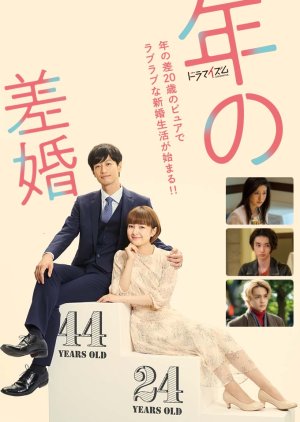Questa recensione può contenere spoiler
Good short watch
What I liked about the drama here was that it did not really affect Harumi and Maiko’s relationship - no breaking up or big fights due to misunderstanding, or jealousy when the exes and the pasts appeared. They remained trusting of each other but it was also nice to see their insecurities and jealousies which was a natural reaction but they did not let it influence them in making irrational decisions.Maiko’s two pasts were such annoying characters - I think the only ones that I didn’t particularly care for in the whole drama. But it was good to watch how Maiko and Harumi handled the situation.
Questa recensione ti è stata utile?

Age Gap Marriage
Toshi no Sakon, which literally translates to age gap marriage, struck me with its cinematography. It's beautifully shot, and I liked how vague the first five minutes about the identity of Murakami Maiko's (Aoi Wakana) husband were. I found some elements of the show refreshing, despite some other elements being a typical Japanese rom-com genre where a sheltered female who has never been in a relationship meets a handsome young man falls in love and end of story.Toshi no Sakon is different in that things happen in reverse. The sheltered girl is more or less forced to go on an arranged marriage matchmaking session. When she meets her match, she instinctively attracted to him and his agreeable nature despite the huge age difference. He, Hanasato Harumi (Takezai Terunosuke), who decides to only meet her to appease his client Murakami Genichiro (Fukikoshi Mitsuru) Maiko's father, is taken by her forwardness, and before we know it, they are married. And this is when the story begins.
I liked Maiko as a character, and Aoi Wakana for her ability to portray Makio in a way that made me believe in her sincerity, innocence and maturity despite her young age, and for boldly pursuing her heart's desire in a culture where one, especially a female, isn't always open about their emotions. She even initiatives the first kiss before their third date, and practically proposes to him. But I enjoyed most about her loudly expressing her inner voice, which is probably what endeared her to Harumi for being the complete opposite of him. As for Harumi, I admired his honesty and how amiable he was to Maiko despite being much older, and more set in his ways, how intrigued he was both physically and mentally. I can't even say it was simply opposites attracted, it was much more than that. It was like the old age meeting the new age and forming an intergenerational connection that's bounded by the differences rather than pulled apart.
I think if Toshi no Sakon had just stopped at that, it would have been your average rom-com with an age gap. But the fact that it dived into the fears and insecurities Maiko faces in her inexperienced love versus Harumi experienced one, and his insecurity with his age and fear of not being able to compete, and the very realistic way the show addresses those insecurities from the Japanese presepctive, is what made Toshi no Sakon stand out even if from my cultural standpoint I may not have understood but that's okay since the show was not for my perspective I still liked and respected the options and directions it takes. The trail and tribulations Maiko and Harumi face as they attempt to measure up to what they each believe are their shortcomings, and the ways the drama tackles and addresses those trials in age, societal and cultural differences, terminology, not only from the perspective of an older man and younger woman, but also from the perspective of an older woman and younger man, and how the intergenerational gap experience despite being the same affects men and women of the same age differently.
The message Toshi no Sakon is so simple -- open dialogue is essential for experiencing, expressing and fostering love in marriage. Despite men and women, be they younger or older, acting differently and communicating in different ways, be in tone or attitude, the need to develop certain attitudes that express love and encourage authentic dialogue is key. Often spouses regardless of age aren't necessarily looking for their other half to find a resolution, they simply want to know their partner is paying attention to them, and acknowledges their fears, and insecurities. And most importantly, not to let societal or cultural differences be they in age or otherwise to limit them or dictate their happiness, because the combination of two different ways of thinking rather than hinder can be the source that elevates them to the next level of their co-existence and ultimately their happiness. Highly recommended, I enjoyed this short but very sweet drama.
Questa recensione ti è stata utile?

A realistic age-gap couple story which doesn't stay away from unnecessary drama!
Contrary to the popular speculation of being a sugar daddy sort of plot, which it didn't turn out to be, my interest was piqued due to very straightforward and rational female lead, 24 years old, who doesn't hesitate to speak her mind and to make the first move when her dad sets her up with 44-year-old divorcee from his business circle. I was baffled at her dad; for no dad in his sanest mind would do such a thing, and what for? That was one of the two questions which I expected this drama to answer. Another one being why FL falls for the ML. But the answers come in a roundabout way, with going down the predictable-plot way, adding unnecessary characters, who do certain actions, and the reasons for those actions aren't revealed or are bland. Other than that, a slice of life age-gap story, with normal conversational type romance. The only thing I liked was their generational gap of pop culture references and their honest conversations.Toshi no Sakon (Marriage with a Large Age Gap) manages with parental support, a nice male lead and spunky female lead but fails to impress.
Questa recensione ti è stata utile?

Questa recensione può contenere spoiler
Great chemistry between engaging leads failed by an inadequate script.
I would love to see a remake of this one with a rewritten script, or a second season with a completely different approach to the story. The premise is a good one: A quiet but youthful 44-year-old divorcee goes on a blind date with the 24-year-old daughter of a customer--at her father’s request, no less. The divorcee agrees to the blind date out of deference to the father thinking it will be a “one and done.” The daughter agrees to the blind date with the father’s assurance that if it doesn’t work out, she’s under no obligation to see him again. Neither go into the date with high expectations but are immediately drawn to each and wind up married three months later. The series goes on to explore the dynamics of a May-December romance, including coping with long established relationships in each other’s respective lives.There is much to like about this short drama. The chemistry between nice guy, Harumi, and his cute young bride, Maiko, is quite touching. Harumi’s affection and respect for his young bride is clear from the start, and Maiko obviously adores her new husband. But their chemistry is failed by a story seems to lurch from plot point to plot point, not ever finding a consistent tempo. The episodes, few in number (8) and short in length (24 minutes) don’t provide much room to maneuver, and the attempts at creating tension between the leads and providing resolution feel ham-handed and forced. It was quite frustrating because I found Harumi and Maiko engaging, and I was eager to see them explore their new relationship.
The first hiccup in the new couple’s new relationship occurs when Harumi’s ex-wife shows up. Harumi handles the situation thoughtfully and respectfully to both women. He neither speaks ill of his ex-wife to Maiko, nor does he make any attempt to hide his actions or shelter either woman from the other. Harumi shows himself to be a stand-up guy.
The second hiccup is handled less gracefully. One of Maiko’s former college classmates shows up to consult on a design proposal. He is immature, arrogant and unfathomably rude when Harumi calls to check on his young wife when she works late. Although the situation eventually sorts itself out, I was left wondering why, of all things, did the writers choose *this* to explore Harumi and Maiko’s relationship?
Then the final hiccup is a fiasco. It arrives in the form of a cross-dressing, con man/boy, second cousin that had grown up with Maiko. (I could not make this up.) We meet Rion in drag when he tries to entrap Harumi in a compromising situation. Nothing that happens afterwards gets any better. When Maiko recognizes her cousin shortly after the attempted entrapment and invites him to stay with her and Harumi, Harumi should have immediately exposed Rion for what he was and been done with him. Instead Harumi struggles to defend himself and his relationship with Maiko from the furious assault of lies and innuendo coming from a jealous and immature Rion who wants Maiko all to him/herself. What were the writer’s thinking? A cross-dressing second cousin? With the wealth of topics opened to them by this engaging May-December relationship, they chose to explore *this* one instead. Mind blown.
Despite all this, the chemistry between Harumi and Maiko is almost enough to carry the show. The story touches on some interesting ideas even if the writers leave the exploration of them incomplete. For example, when Maiko finds some old pictures of Harumi singing karaoke from his college days Harumi quickly discovers that Maiko knows nothing about the music and bands that were so much a part of his life back then. Instead of riffing on this for an episode, the writers chose to have Harumi put a lid on his box of memories and gently encourage Maiko to look forward to their future together and not dwell on his past.
What about Maiko’s mom? She left Maiko’s father who was 12-years her senior, but why? Could Maiko and Harumi learn from the experience of Maiko’s parents? Blending the friend groups of a newlywed couple from two entirely separate social circles presents challenges to same age couples. What additional challenges do May-December romances face? What are Harumi and Maiko’s thoughts on having children? All of these topics would have been much more interesting than a cross-dressing con man/boy. It is a shame that they were left unexplored.
Questa recensione ti è stata utile?

De lo fresco a lo predecible.
Este drama tiene una sipnosis interesante, 20 años de diferencia entre la pareja daba para muchos temas, y el principio fue muy entretenido, como la forma en que se conocieron , pero pasan los capítulos y llegan los elementos tan predecibles de telenovela que para personas como yo que han visto muchos dramas, hace que este lo vea como una historia con desarrollo bien pobre (que cada cap. dure solo 25 min no es excusa para no mostrar una buena historia), no sé, a lo mejor tenía muchas expectativas con este drama y se cayeron conforme avanzaba los capítulos.Pese a que la historia decepciona, se nota que le echaron ganas a la producción y las actuaciones no son malas, las canciones que forman parte del OST me han gustado mucho.
Questa recensione ti è stata utile?

So cute
This was short, sweet and really warm. I’ve watched so many dramas that was fluffed with crazy things but this was a light hearted delight. No extreme misunderstandings. No weird triangles, events or crazy breakups.I loved, loved, loved the communication between the couple. It was clear, direct, honest and productive. The series had a someone youthful feel to it but the relationship itself felt very mature.
I highly recommend this if your looking for a short, sweet and cute romance.
Questa recensione ti è stata utile?

The jdrama that changed my mind about jdramas
In the past, I've struggled (and failed) to get into jdramas for a variety of reasons. I'm terribly impatient and picky about which dramas I watch, so it takes A LOT for me to invest time in one. Which is why I'm surprised by how taken I was with this drama.TnS is yes, a predictable story with some loopholes but it has just a few episodes. The leads nail their parts of playing two people weathering a 20-year age gap between them, and they do so adroitly and charmingly. There's also just enough tension in the story to keep one's interest. I also appreciated two things in TnS which I find very important in an Asian drama:
> the story deals with a married couple, and the treatment of their intimate scenes was done tastefully and REALISTICALLY. (No spoilers, please watch to understand what I mean). It was a terrific change to not have to dumb down this aspect especially since I left high school decades ago.
>I am glad that there was enough care put into the clothing and style of the actors. Everyone dressed their age and acted accordingly. It was refreshing and appealing.
Anyway, I'm hoping you give this show a try. All dramas ask us to suspend disbelief to a point, this one included, but I enjoyed the ride. Hope you will too.
Questa recensione ti è stata utile?

A verry nice story about marriage bonds
A very cute and light series, in a pointillist and subtle style as Japanese directors know how to do :), on an arranged marriage between 1 FL "novice" in romance aged 24, and 1 ML, 40, divorced.How bonds are forged, trust develops, over the difficulties.
Very nice and feel good.
-----------------------------------------------------------------------------------------------------------------
Une série très cute et light, dans un style pointilliste comme savent le faire les japonais :), sur un mariage arrangé entre 1 FL "novice" en romance de 24 ans, et 1 ML d ans divorcé. Comment les liens se nouent, la confiance se développe, au fil des difficultés.
Très sympa et feel good.
Questa recensione ti è stata utile?

BetterLatteMelbourne
1 persone hanno trovato utile questa recensione
Age doesn't matter
I like the storyline that revolves around a couple though i am not sure about the impetus for the marriage.Harumi portrays a mature man who is protective to his wife and sensitive to her needs. Maiko shows respect and love for her husband. Somehow, the communication becomes lost between them when things don't go well.
When Harumi did not explain why Rion cannot continue to stay in the house, Maiko did not pursue more but left the house instead. I wonder whether this is a cultural thing or that the relationship was not developed enough to talk these things through.
Nevertheless, it was a short story that reassures a possible and promising marriage of such. And it's an easy watch too!
Questa recensione ti è stata utile?

年の差婚
This drama started as a cute love story two people deciding to marry with contract. Murakami Maiko is a very sheltered girl who has never had a relationship with a guy. Her new husband is much more older than her, he is very charming and handsome. His name is Harumi and he intended to meet Maiko once before he turned her down since she is the daughter of the CEO of an important client. Despite their age gap of 20years they get along well, when sudennly there is a plot twist and she meets her old childhood friend who is still in love with Maiko. Harumi and Maiko start having little fights and have this jealousy, but in the end Maiko chooses Harumi and can't compared her love to another :)Questa recensione ti è stata utile?

Maiko nunca esteve em um relacionamento, mas aceita ir em um encontro às cegas indicado pelo pai, e lá conhece Harumi, um homem 20 anos mais velho que é divorciado. Ela se vê atraída pelo jeito encantador dele, ele no entanto, à primeira vista não queria levar o encontro à diante, mas percebe nela algo diferente.
Esse drama japonês é basicamente sobre como manter um relacionamento apesar das diferenças. É muito maduro e cativante. Maiko é uma jovem brilhante e cheia de vida; Harumi é um homem que não via a possibilidade de encontrar um novo interesse amoroso desde que seu casamento não deu certo. Mas os dois, com o dia a dia percebem que são mais compatíveis do que imaginavam.
Em seus 8 episódios, "My-December Marriage" mostra as dificuldades de se viver à dois, como também os prazeres de dividir a vida com alguém. Maiko precisa entender como deixar o marido fazer parte da vida dela, e Harumi não quer cometer os mesmos erros do passado.
Achei a atuação muito boa e foi um drama japonês que não tem tanto a parte cômica e caricata na protagonista feminina como é comum ver em mangás. Maiko tem um trabalho que quer ser excelente, tem domínio da própria vida e desejos; assim como Harumi, que tem seus desafios como homem mais velho.
Indico muito esse j-drama!
Questa recensione ti è stata utile?

 1
1































